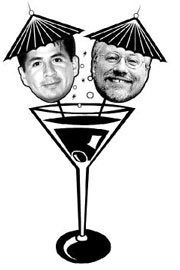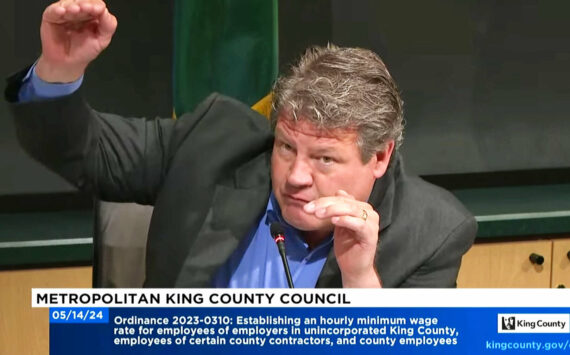“I’M NOT A CANDIDATE who wants to get elected,” says Jay Sauceda. “More than likely I won’t make it through [the primary election], which is good.”
What the hell is this candidate doing? Sauceda isn’t running to win, but rather to promote an initiative to change the way we elect the Seattle City Council. He prefers neighborhood district elections to our present system of citywide representation. Unfortunately, Sauceda’s candidacy is both an exercise in futility and a glaring example of how the people who fight the city’s downtown establishment fail to mount meaningful opposition time and time again.
Sauceda is running against incumbent Seattle City Council member Richard Conlin. Before this election, Sauceda was best known as an aide to former City Council member Charlie Chong. He was also involved in the local effort to promote the first presidential run of H. Ross Perot and got his start in politics by opposing the Gulf War.
Sauceda wants to change local government through his district elections initiative. He says running citywide means a candidate has to contact lots of voters, which costs a lot of money. Incumbents are usually re-elected easily. Republicans and independents don’t have good representation at City Hall; the City Council is dominated by limousine liberal Democrats. It also means constituents don’t know whom to contact if they have a problem in their neighborhood since all City Council members represent all of Seattle.
Sauceda’s alternative is to elect seven City Council members to represent districts—collections of geographically adjacent neighborhoods such as Wallingford, Fremont, and the U District, for instance. (Two council members would continue to be elected citywide as “at-large” representatives.) He believes upstart candidates will find it easier to challenge the status quo if they can ring doorbells in a district of 80,000 people rather than a city of 550,000. A previous district election initiative, for which Sauceda was a volunteer signature gatherer, was clobbered in 1995.
Leaving aside the question of whether district elections will actually bring us better government (study the warring body known as the King County Council, which is elected by districts, and get back to me), why is Sauceda running for City Council when he really wants to start an initiative campaign?
His answer: access to press, candidate forums, and activists. But that doesn’t fly. A districts initiative would get ample press coverage from start to finish. Not only are the local weekly papers favorably inclined toward districts editorially, but Seattle Times columnist Mindy Cameron, who has the biggest newspaper soapbox in the state, wrote favorably about district elections a few times last winter. As far as candidate forums go, if Sauceda showed up with decent literature, he’d reach plenty of engaged individuals. Now he just comes off as someone who is doing one thing poorly (running for office) instead of figuring out how to do another thing well (running an initiative campaign).
Sauceda has already stumbled in a couple of major ways. First, he inadequately researched the change he wants to bring about. Switching to district elections would involve changing the city charter, which can be done only during a “general municipal election.” Those occur not every year but every two years. So Sauceda must wait until 2003 to put his initiative on the ballot. The prospect of maintaining a two-year campaign “has taken the wind out of our sails,” he admits.
The second major gaffe Sauceda has committed is failing to contact Yes for Seattle, the organization that recently completed a successful drive to put Initiative 63, a measure that would promote water conservation to save salmon, on the ballot. (Currently, Yes for Seattle is battling the city over the legality of I-63.) Yes for Seattle is exploring putting a districts initiative on the ballot, and they have the experience, the fund-raising ability, and the volunteer base to do so.
All of this adds up to Sauceda coming off as a half-baked amateur. It’s too bad, because he is a smart guy with a decent cause. He could also be a good candidate: He knows quite a bit about City Hall and he speaks well, communicating both his knowledge and his personal warmth. As one of Chong’s lieutenants, he represents the next generation of people who will oppose the excesses of City Hall. When he marginalizes himself unnecessarily, he hurts many of the folks who are on the outside of city government looking in.








